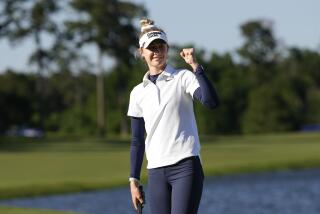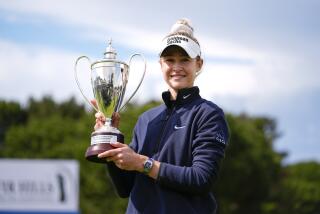Sweet and Sour to Meet in Final
- Share via
MELBOURNE, Australia — If anyone had to end the improbable run of the engaging young Frenchman Nicolas Escude, it figured to be Marcelo Rios, the tennis tour’s resident sourpuss.
Friday’s men’s Australian Open semifinal stopped short of producing the sort of odd but scintillating results so rampant here. Rios’ fire singed the cool Escude and dumped him in only one hour 23 minutes, 6-1, 6-3, 6-2, sending the Chilean into Sunday’s final against Petr Korda of the Czech Republic.
The sixth-seeded Korda defeated Karol Kucera late Thursday, 6-1, 6-4, 1-6, 6-2. Korda had minimal trouble eliminating the man who eliminated Pete Sampras.
Rios has landed in his first Grand Slam final, a position many have expected of the ninth-seeded player. For Korda, it has been six years since he has been present in a Grand Slam final. Korda lost to Jim Courier in the finals of the 1992 French Open and has not been in the Top 10 since then.
The two left-handers offer differing playing styles and personalities: Korda is an all-court player who likes to do split jumps and cartwheels after victories. Rios is an attacking baseliner who walks briskly off court after victories. The two have met six times with each player winning three.
Rios ousted the most unexpected player at a tournament packed with them. Escude, the unseeded 21-year-old playing in his first Australian Open, began to gain notice when he defeated French Open champion Gustavo Kuerten in the second round.
Escude came back from two sets to love three times here, something no player has ever done at a Grand Slam event.
“I feel like a living sleeping pill,” he said in his fractured English. “Like I’m in a dream, so relaxed. And I want the dream to continue. It’s amazing, unbelievable. I don’t know why this is happening.”
Unfortunately for the world’s No. 79, he played in Friday’s semifinal as if he had been taking sleeping pills. Escude made 44 unforced errors and squandered the few break points he managed to manufacture. He converted on only two of six break opportunities, points he sorely needed.
Rios was efficient and workmanlike and surprised Escude by his willingness to approach the net in a bid to end points more quickly. Like many players here, Rios has been suffering from late-match muscle cramps. He defeated Alberto Berasategui in four sets in the quarterfinals and acknowledged after the match he would have been unable to play a fifth.
Escude, too, was fatigued.
“Marcelo was playing very well,” Escude said. “I was just tired. It was very difficult for me to warm up before the match today. It has ended.”
Rios is the tour’s most fearsome young player, both for the quality of his play as well as his dour demeanor. The 22-year-old has grown up markedly since he turned pro in 1994. Then, he was indifferent to his peers, hostile to the media and abusive to fans.
The lowlight of this petulant period came at Indian Wells two years ago, when Rios used a racial epithet to a chair umpire and spit on a young fan who asked for his autograph.
Rios has been rehabilitated since then. He’s still uneasy talking to reporters but is now willing to do so. He’s far from outgoing, but it’s hardly the point: Rios has honed his game into a damaging form of baseline punishment.
Korda is enjoying what he calls a “very nice ride,” an understatement, considering his recent setbacks, which have included surgery and declining interest in the game.
His fragile health has regained its former rosiness, as has his outlook.
“I am really enjoying tennis any time I’m stepping on the court,” he said. “I think people can see that, how I’m hitting the ball and how I’m enjoying tennis.”
More to Read
Go beyond the scoreboard
Get the latest on L.A.'s teams in the daily Sports Report newsletter.
You may occasionally receive promotional content from the Los Angeles Times.











